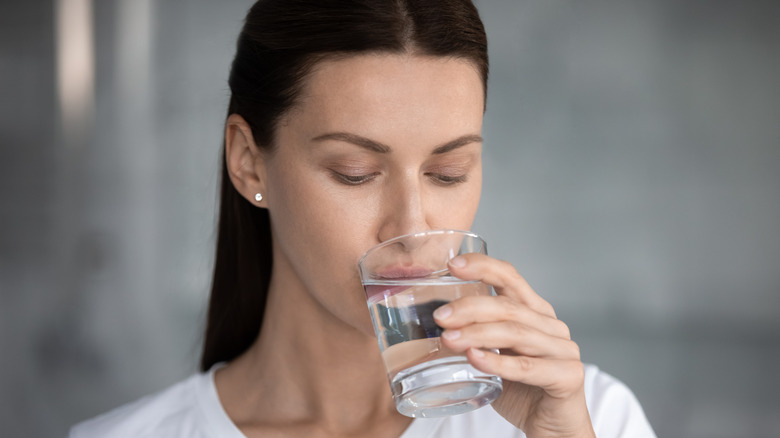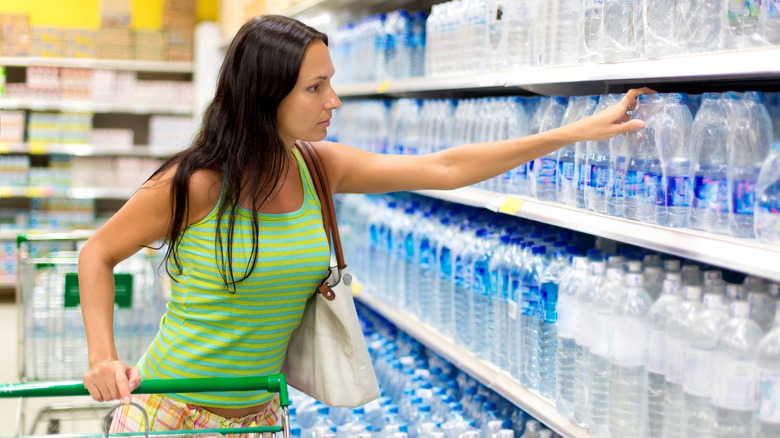How Drinking Water Really Helps With Weight Loss
Chances are, you've heard that drinking water can boost your metabolism and make it easier to keep the pounds off. But can you trust these claims? First, it's important to understand that water doesn't magically melt away fat. Second, it won't kick your metabolism into high gear as it was once thought. "I'm not saying drinking water isn't good; but only one study showed people who drank more water burned a few extra calories, and it was only a couple of extra calories a day," explains registered dietician Beth Kitchin (via Science Daily). Likewise, drinking ice-cold water doesn't really make a difference. "While there may be a few extra calories lost, it won't be nearly enough to make a dent in your weight-loss endeavors," says Kitchin.
The human body is around 60% water, according to the United States Geological Survey. This vital fluid lubricates your joints, supports digestion, and regulates body temperature. It also carries oxygen and nutrients to your cells and helps flush out waste. But even so, it's not necessary to drink eight glasses of water per day. There's no scientific evidence to back up this recommendation, explains the American Journal of Physiology. What matters most is to drink enough water to stay hydrated. That could mean five, six, nine, or more glasses of water per day, depending on your activity level and individual needs.
But what happens if you start drinking more water? Would it really help with weight loss? Let's find out.
Drinking more water can facilitate weight loss, but not in the way you think
Many dieters believe that drinking more fluids can fire up their metabolism, suppress appetite, and increase fat burning. That's not entirely false, but rather overstated. For example, nearly 40% of people mistake thirst for hunger, reports the Polycystic Kidney Disease Foundation. You may be able to keep your appetite in check by drinking water if you're slightly dehydrated rather than hungry, notes Dr. Melina Jampolis (via Johns Hopkins University). She also explains that water also fills you up, which in turn helps increase satiety.
Water can also give you a slight metabolic boost, but not in the way you think. Even mild dehydration can affect your metabolism. Therefore, staying hydrated may prevent your metabolism from slowing down. "Think of it like your car: if you have enough oil and gas, it will run more efficiently. It's the same with your body," Dr. Trent Nessler told WebMD. Animal studies also suggest that proper hydration increases fat burning, but more research is needed to determine if these findings apply to humans (per Frontiers in Nutrition).
Fill up on water to cut calories
Drinking more water may help with weight loss by reducing your calorie intake. Soft drinks, smoothies, milkshakes, alcoholic beverages, and fruit juices all provide calories. Moreover, they may increase food intake when consumed along with a meal (via the Center for Science in the Public Interest). Replacing soda and other caloric beverages with water can help you cut calories and facilitate weight loss.
In one study, overweight and obese people who swapped caloric drinks for water experienced a 2% to 2.5% reduction in body weight, reports the American Journal of Clinical Nutrition. Water is also a better choice than diet beverages. In a clinical trial, women who replaced diet soda with water after their main meal lost 13.6% more weight and experienced greater improvements in insulin sensitivity than those who continued to drink diet soda.
Water isn't a magic bullet for weight loss, but it can help. Think about how many calories you can save just by replacing your morning latte with a glass of water. Unsweetened tea is a good choice, too. Green tea, for example, can speed up your metabolism and increase fat oxidation, suggests a 2017 study featured in Physiology and Behavior. Remember, you can always add fresh peppermint leaves or lemon juice to your water for extra flavor.


